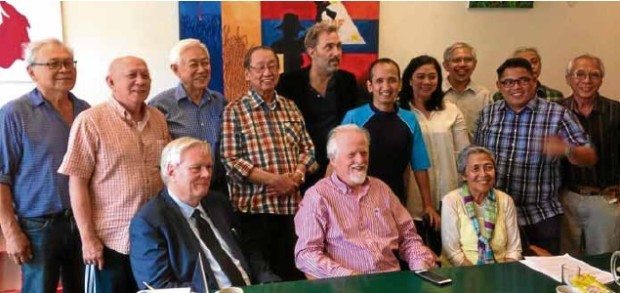Duterte men, NDFP start peace negotiations in July

PEACEMAKERS Communist Party of the Philippines founder Jose Maria Sison (standing, fourth from left) and other participants in the peace talks pose for a historic photo. CONTRIBUTED PHOTO
Taking a step toward ending one of the world’s longest communist struggles, incoming officials of the Duterte administration and the National Democratic Front of the Philippines (NDFP) are set to resume formal peace talks in the third week of July.
Their two-day exploratory talks in Oslo, Norway, culminated amid banter and laughter in the signing of a joint statement on Wednesday.
Both panels agreed to accelerate negotiations and to put on the negotiating table critical issues, such as the grant of amnesty to rebels and the release of all political prisoners, “subject to concurrence by Congress.”
Both sides also endeavored to discuss “the timeline for the completion of the remaining substantive agenda of the talks, socioeconomic reforms, political and constitutional reforms, and end of hostilities and disposition of forces.”
The Oslo meeting pushed through on the directive of incoming President Rodrigo Duterte, who has vowed to serve as a unifying leader who would pursue peace negotiations not just with the Left but with secessionist forces in his native Mindanao.
Article continues after this advertisementArticle continues after this advertisement
First directive
Initiating talks with the Left was his first directive upon appointing Jesus Dureza as his peace adviser.
Duterte, who had described himself as “once upon a time left of center,” has appointed NDFP nominees in his Cabinet, an unprecedented inclusion.
He has also promised to release political prisoners as an act of goodwill upon the resumption of the talks.
He has said he would give safe conduct to Jose Maria Sison should the Communist Party of the Philippines founder and NDFP’s chief political consultant push through with his planned homecoming from Utrecht, The Netherlands.
Sison, Duterte’s former professor, has been exiled for almost three decades as the protracted communist insurgency remained unresolved.
In a joint statement, which was furnished the Inquirer minutes after it was signed in Oslo past midnight Wednesday (Manila time), the two panels agreed to discuss a “mode of interim ceasefire” during the talks.
The negotiations will tackle the reconstitution of the Joint Agreement on Safety and Immunity Guarantees (Jasig) list, which provides protection to negotiators, consultants, staffers and other individuals involved in the talks.
Under the latest two-page agreement, the Duterte panel said it would recommend “the immediate release of NDFP consultants and other Jasig protected persons in accordance with the Jasig to enable them to participate in the negotiations.”
Signatories
The panel vowed to take up with the incoming President the “immediate release of prisoners/detainees based on humanitarian grounds.”
Dureza, incoming Labor Secretary Silvestre Bello III, and incoming government panel member Hernani Braganza signed on behalf of the administration-in-waiting.
Luis Jalandoni, Fidel Agcaoili and Sison signed on behalf of the communist-led NDFP.
Ambassador Elisabeth Slattum, Norway’s special envoy to the Philippine peace process, signed as witness.
Dureza said that the breakthrough in the stalled talks should be credited to the political will of the incoming administration to finally find a peaceful solution to the conflict.
“A lot of it really came from the bold and out-of-the-box positions taken by President Rody Duterte. I think we should give it to him in terms of these first steps. There are still many steps but this is a very significant step,” he said.
Sison called the preliminary talks successful and shared that the revolutionary movement was determined to move forward. “Our side is very happy,” he said in his closing statement.
Slattum said that the first of many meetings had been positive, optimistic and very productive. “I am very pleased that you decided to resume the formal talks,” she said.
Reached in Oslo, NDFP legal consultant Edre Olalia said the talks were dominated by “high spirits and continuous banter.”
“[The talks were] hopeful, expectant. [A] big baby step and a good start,” he told the Inquirer.
“Lots of bantering, smiles and laughter,” Olalia said in an online interview on Thursday.
He said the exchanges of arguments between the two panels were “mainly candid and open, with desire to move forward.”
Legislated amnesty
Olalia said a legislated amnesty grants liberty to a group of people and wipes out offense and criminal liability. “[The granting of] amnesty need not require admission of guilt unlike [a presidential] pardon. Amnesty also applies both to [those] convicted and not,” he said.
The militant human rights group, Karapatan, welcomed the planned amnesty and urged lawmakers to speed up the process.
“We understand that the amnesty should pass the legislative mill. But we appeal to our lawmakers to pass the law [immediately] to prevent another injustice to the political detainees,” Cristina Palabay, Karapatan secretary general, said in a telephone interview on Thursday.
“Another day in prison is another day of injustice for these [people] who were illegally arrested, tortured and jailed,” she said.
Palabay said the proposed amnesty should be “general, omnibus and unconditional.”
“General means all political prisoners. Unconditional means no precondition is set before they can be released. Omnibus means that all charges or offenses against them are covered by amnesty,” she said.
She appealed to Duterte to prioritize the release of 74 detainees across the country, who had been in prison for more than 10 years but had not yet been convicted.
At least 297 of 509 political prisoners (as of May 31 this year) were “illegally arrested” during the administration of President Aquino, Palabay said.
Eighteen of the total number of detainees are NDFP peace consultants, 88 are suffering from various illnesses, and 48 are elderly, she added. With a report from Karlos Manlupig, Inquirer Mindanao